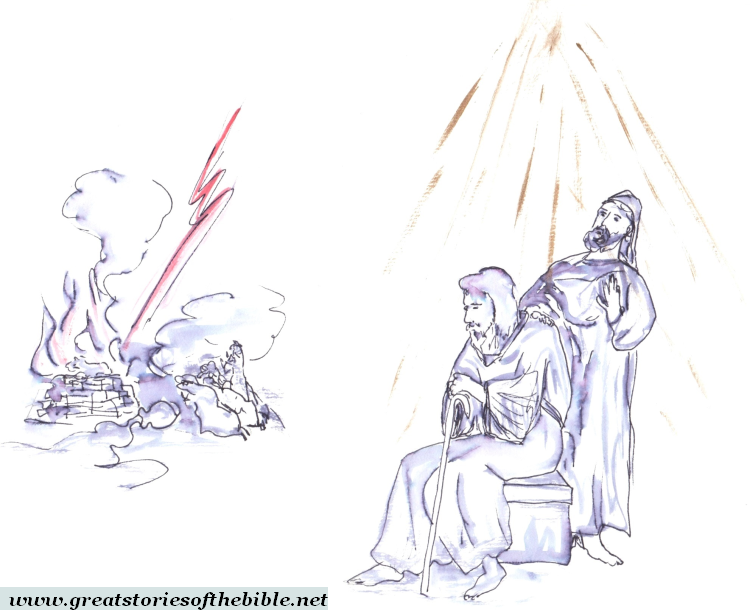Micah (“who is like God?”) and Nahum (“God comforted”)
I am full of power by the Spirit of the Lord
«The word of the LORD that came to Micah the Morashtite in the days of Jotham, Ahaz, and Hezekiah, kings of Judah, which he saw concerning Samaria and Jerusalem» (Mic 1,1). Prophet Micah is a contemporary of Isaiah (VIII century BC); like him, Micah carries out his ministry in the southern kingdom of Judah. He prophesies against the injustices of the ruling classes, who would like to mute him: «“Do not prophesy!” They prophesy. “Do not prophesy about these things. Disgrace won’t overtake us.” Shall it be said, O house of Jacob: “Is the Spirit of the LORD angry? Are these his doings? Do not my words do good to him who walks blamelessly?” But lately my people have risen up as an enemy. You strip the robe and clothing from those who pass by without a care, returning from battle. You drive the women of my people out from their pleasant houses; from their young children you take away my blessing forever. Arise, and depart! For this is not your resting place, because of uncleanness that destroys, even with a grievous destruction. If a man walking in a spirit of falsehood lies: “I will prophesy to you of wine and of strong drink;” he would be the prophet of this people» (Mic 2,6-11). In fact, there are false prophets who please their listeners in return for material benefits: «Thus says the LORD against the prophets who lead my people astray; for those who feed their teeth, they proclaim, “Peace!” and whoever doesn’t provide for their mouths, they prepare war against him: “Therefore night is over you, with no vision, and it is dark to you, that you may not divine; and the sun will go down on the prophets, and the day will be black over them. The seers shall be disappointed, and the diviners confounded. Yes, they shall all cover their lips; for there is no answer from God.” But as for me, I am full of power by the Spirit of the LORD, and of judgment, and of might, to declare to Jacob his disobedience, and to Israel his sin» (Mic 3,5-8). However, in 5,1 we can find a well-known messianic oracle, sign of the Lord’s faithfulness: «But you, Bethlehem Ephrathah, being small among the clans of Judah, out of you one will come forth to me that is to be ruler in Israel; whose goings forth are from of old, from everlasting». Evangelists Matthew (2,6) and John (see 7,42) recall it to mean Jesus’ birth.
Here is instead the rîb (see Jeremiah - episode 2) that the Lord institutes against His people, with the mountains of the earth as witnesses, reminding them of all the benefits received in the Exodus and the entrance into the Promised Land. «Listen now to what the LORD says: “Arise, plead your case before the mountains, and let the hills hear what you have to say. Hear, you mountains, the LORD’s controversy, and you enduring foundations of the earth; for the LORD has a controversy with his people, and he will contend with Israel. My people, what have I done to you? How have I burdened you? Answer me! For I brought you up out of the land of Egypt, and redeemed you out of the house of bondage. I sent before you Moses, Aaron, and Miriam. My people, remember now what Balak king of Moab devised, and what Balaam the son of Beor answered him from Shittim to Gilgal, that you may know the righteous acts of the LORD.” How shall I come before the LORD, and bow myself before the exalted God? Shall I come before him with burnt offerings, with calves a year old? Will the LORD be pleased with thousands of rams? With tens of thousands of rivers of oil? Shall I give my firstborn for my disobedience? The fruit of my body for the sin of my soul? He has shown you, O man, what is good. What does the LORD require of you, but to act justly, to love mercy, and to walk humbly with your God?» (Mic 6,1-8). The sincere worship that the prophets point out is not made by mere external rites, but by attention and care towards the needy neighbor. Only with this love prayers are genuine and they can come to the Lord.
We know very little about Prophet Nahum. His name means “comforted”: he “comforts” the remnant of the people with prophesying the Lord’s terrible intervention against Nineveh and the Assyrians. We are probably around the middle of the VII century BC: Israel (721 BC) and the Egyptian city of Thebes (664 BC: see Nah 3,8-10) were wiped out by the Assyrians’ power. «The LORD is good, a stronghold in the day of trouble; and he knows those who take refuge in him. But with an overflowing flood, he will make a full end of her place, and will pursue his enemies into darkness» (Nah 1,7-8). I leave to your personal reading the very strong oracle against Nineveh, from which we can understand well how much evil the Assyrians did and how bitter is the Elected People’s rancor against them (do you remember the Book of Jonah we read in the last post?). Nineveh will effectively fall under the Babylonian attacks in 612 BC.
In the next posts we will write about Habakkuk and Zephaniah.